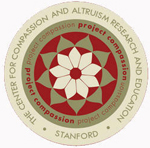|
|
Empathy-Compassion Conferences:
 |
The Science
of Compassion Origins, Measures and Interventions Hosted By The Center for Compassion and Altruism Research and Education (CCARE) July 19-22, 2012 - Telluride, Colorado http://j.mp/Uy6LW9 "The Science of Compassion: Origins, Measures, and Interventions, which took place July 19th to 22nd in Telluride Colorado, was the first large-scale international conference of its kind dedicated to scientific inquiry into compassion. The conference convened a unique group of leading world experts in the fields of altruism, compassion, and service to present their latest research." |
Public Google Doc for taking notes, transcribing, discussions, etc on the various talks and panels given at the conference.
Program Schedule Outline
Dr. James Doty, Welcome Address
Keynote Address Richard Davidson
Keynote Address Paul Ekman
Panel 3: Self-Report, Autonomic and Behavioral Measures of Compassion
Panel 4: Neurotransmitters, Neuropeptides, Genes and Compassion
Program Schedule and Videos
Welcome Address - Opening Comments - Dr. James Doty,
Keynote Address 1 - Richard Davidson
Keynote Address 2 - Paul Ekman
Outline
Charles Darwin. "We are.. impelled to relieve the sufferings of another, in order that our own painful feelings may be at the same time relieved. The mere sight of suffering, independently of love, would suffice to call up in us vivid recollections and associations. "
Dali Lama, "In the human mind, seeing someone bleeding and dying makes you uncomfortable. This is the seed of compassion... We are thus impelled to relieve sufferings of another, in order that our own painful feelings may be at the same time relieved..."
Four types of Compassion (typology in terms of the Target)
1. Familial Compassion - Root or Seed
Is it an emotion? Doesn't think so.
2. Familiars Compassion - friends, neighbors, work associate.
Darwin: " many a civilized man, or even boy, who never before risked his life for another, but full of courage and sympathy, has disregarded the instinct of self preservation and plunged at once into a torrent to save a drowning man, though as stranger"
3. Stranger Compassion
some or all strangers (global compassion)
based on similarities in appearance, culture
"..a savage will risk his own life to same that of a member of the same community, but will be wholly indifferent about a stranger: a young and timid mother urged by the maternal instinct will, without a movement's hesitation, run the greatest danger for her own infant, but not of the mere fellow creature."
Why stranger compassion is not an emotion?
What produces stranger compassion without training?
chance
upbringing
genetic
previous incarnation
4. Sentient Compassion
Darwin. "Sympathy beyond the confines of man, that is humanity to the lower animals, seems to be one of the latest moral acquisitions….This virtue [concern for lower animals], one of the noblest with which man is endowed, seems to arise incidentally from our sympathies becoming more tender and more widely diffused, until they extend to all sentient beings." (Darwin’s views on human compassion)
Different typologies possibilities
Darwin: " (Compassion is of).. high importance to all those animals which aid and defend one another, it will have been increased through natural selection; for those communities, which included the greatest number of the most sympathetic members, would flourish best, and rear the greatest number of offspring."
1:0 Scientific Panel 1: Origins and Conceptual Models of Compassion
1:1. Thupten Jinpa, Ph.D., Stanford University/McGill University - "Nature, Origins & Developments of Compassion: from a Buddhist Understanding"
1:2. Stephen W. Porges , Ph.D., Brain-Body Center, University of Illinois at Chicago - "The Origins of Compassion: A Phylogenetic Perspective"
1:3. Stephanie Brown, Ph.D., Stonybrook University - "Placing Compassion in a Neurobiological and Evolutionary Framework"
1:4. Jeff Simpson, Ph.D.,University of Minnesota - "Evolutionary Perspectives on Prosaically Behavior"
1:5. Emiliana Simon-Thomas, Greater Good, UC Berkeley/CCARE, Stanford University - - (Moderator)
1:6. David DeSteno, Ph.D.,Northeastern University - "Character in the Balance: Exploring the Causes and Consequences of Compassion"
1:1. "Nature, Origins & Developments of Compassion: from a Buddhist Understanding" Thupten Jinpa,
1:2. "The Origins of Compassion: A Phylogenetic Perspective" Stephen Porges, Ph.D.